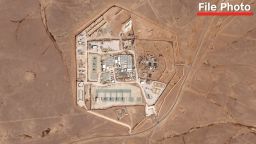Editor’s Note: Frida Ghitis, a former CNN producer and correspondent, is a world affairs columnist. She is a weekly opinion contributor to CNN, a contributing columnist to The Washington Post and a columnist for World Politics Review. The views expressed in this commentary are her own. View more opinion on CNN.
The world once again is trying to parse the stance of North Korean dictator Kim Jong Un. Is Kim positioning his regime to gain from the possibility that former President Donald Trump will return to the White House a year from now – or preparing to start a war?

North Korea watchers long ago grew accustomed to Kim’s dramatic pronouncements and spectacular military tests aimed at projecting power. But in recent weeks, something has changed. And some experts think this time we should be alarmed.
Kim “has made a strategic decision to go to war,” wrote Robert Carlin and Siegfried Hecker, two scholars with experience in national security who are not known for exaggerating the North Korean threat.
The ominous assessment is even more troubling because the world is now facing two raging military conflicts, in Ukraine and the Middle East, each with potential to escalate and both pitting adversaries of the West against US allies. That detail, which might sound incidental to what happens in North Korea, may be the key to why Kim is making moves that sound like the prelude to war. That doesn’t mean the risks are not real.
“The situation on the Korean Peninsula is more dangerous than it has been at any time since early June 1950,” warned Carlin and Hecker in an article that has made waves across the globe. Although they do not link Kim’s belligerent moves to events elsewhere.
June 1950, by the way, was when North Korea’s grandfather, Kim Il Sung, launched an invasion of South Korea, triggering the Korean War, which left millions dead, involved more than a dozen countries and devastated both North and South Korea. After North Korea was defeated, the fighting stopped with a 1953 armistice but a peace agreement was never reached. Today, nearly 30,000 US troops remain in South Korea.
Kim has certainly been signaling that something fundamental has shifted and he clearly wants the world to take his threats seriously.
For decades the Democratic People’s Republic of North Korea or DPRK, has had two explicit goals. One is to peacefully reunify with the South, the other is to normalize relations with the US. Both of these seem to have been discarded.
Kim just ended the policy of peaceful reunification, calling South Korea the DPRK’s “primary foe” and “principal enemy,” ordering the demolition of Pyongyang’s giant Arch of Reunification monument, built by his father, and disbanding state agencies tasked with reunification.
Simultaneously, he said North Korea tested, among other weapons, medium-range hypersonic missile technology that could allow attacks on the South to dodge antimissile systems.
South Korea is responding with equally forceful rhetoric. On Tuesday, at a cabinet meeting in Seoul, President Yoon Suk Yeol said “If North Korea provokes, we will punish them multiple times as hard.”
Carlin and Hecker say what we’re hearing is not the familiar Kim bluster. In their view, Kim has had a transformative change of perspective. Above all, they say, he has decided that the strategy of seeking to normalize relations with the United States has failed. That conclusion was reached after the 2018 and 2019 summits with then-President Trump. They are not the only ones who say the failure to reach agreement was an embarrassment (perhaps for both) but was reportedly traumatic for Kim.
In 2021, the Biden administration tried to restart talks, vowing to meet “anywhere, anytime, without preconditions.” North Korea has ignored the overtures, which the US recently repeated. Kim, however, passed a law in 2022 declaring, “no denuclearization, no negotiation and no bargaining chip to trade.”
But there’s more happening beyond the failure of talks with the US.
Kim has developed a strategic relationship with Russian President Vladimir Putin, traveling to Russia for warm in-person meetings and providing armaments to bolster Russia’s depleted arsenal in its war against Ukraine. The two countries deny it, but there’s evidence the DPRK has sent more than a million artillery pieces, and the Biden administration says Russia is using advanced North Korean missiles against Ukraine.
So, what’s Kim thinking?
It’s impossible to know with certainty, but there’s little question that he’s at the very least trying to create problems for the West at a time when it has its hands full with two major wars.
With the US occupied with other crises, Kim may be wagering that his own hand is stronger; that the US would be more inclined to make concessions.
But perhaps most importantly, a military crisis in East Asia, involving top US allies (South Korea and perhaps Japan) would be a boon to Putin, distracting the West from Ukraine just as the Middle East has already done.
It’s also possible that Kim is trying to strengthen his negotiating position in advance of a possible new Trump administration. Politico recently reported that, if he’s reelected, Trump is planning to offer Kim a deal that would lift economic sanctions and allow him to keep his nuclear weapons if he freezes the nuclear program. Trump said the story is a fabrication, without exactly denying the report.
Get Our Free Weekly Newsletter
- Sign up for CNN Opinion’s newsletter
- Join us on Twitter and Facebook
The warning about North Korea cannot be ignored, and the US, South Korea and Japan should update their planning.
But there are reasons to be skeptical of the argument that a massive assault is in the cards. It’s hard to imagine that if he were planning to launch a full assault, Kim would be sending large quantities of his weapons stocks to Russia.
And, however erratic, would Kim start an all-out war that he would surely lose?
What is beyond question now is that Kim, whose only meaningful relationship used to be with China, has now entered the Russian orbit. His foreign minister was just in Moscow and North Korean media say Putin will visit Pyongyang.
In an echo of the Cold War, the world is dividing in rival camps and no conflict is completely isolated from the others. The wars in Ukraine and the Middle East increase the risk of a new Korean conflict, raising the potential stakes for everyone.






